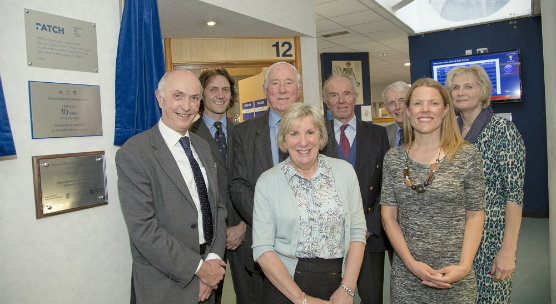Efforts to help doctors treat the dying recognised
Published On Wed 2 Nov 2016 by Grant Hill

A plaque marking the University of Dundee’s efforts to help doctors care more effectively for the dying has been unveiled at Ninewells Hospital.
Palliation and the Caring Hospital (PATCH), a charity which supports specialist palliative care for patients in Scotland, unveiled the plaque at a ceremony attended by representatives of the University’s School of Medicine and NHS Tayside.
The charity initiated the accolade in recognition of the unique collaboration between the three organisations, who have developed a series of workshops to help healthcare professionals have honest and open conversations with patients and their families about dying. These discussions are particularly important for people whose needs might be better served by active palliation of their symptoms rather than other healthcare interventions.
The half-day sessions began in March, and include open discussions, practical opportunities and expert feedback. The activity is simulation-based, with debriefing by skilled faculty using video recordings of conversations with simulated patients and actors.
The School of Medicine ultimately aims to open the workshops to healthcare providers from other institutions around the country, and to share materials and resources needed to deliver the training.
Dr Ben Shippey, Director of the University’s Institute of Healthcare Education (IHSE), said, “In Western societies we seem to have lost our way with regard to recognising and caring for people who are dying.
“Advances in medical technology mean there is an overwhelming pressure to offer treatments to people where the benefit to them is less clear, because it can be psychologically easier for healthcare professionals to commit to unpleasant – and ultimately futile – treatments than to ask ‘are you really sure that’s what you want?’
“The skills healthcare professionals need to engage with these open and honest conversations can be learned -- and we in the IHSE believe we can deliver that learning effectively and efficiently using simulation-based learning.
“We hope this training will be a step towards a cultural shift so that healthcare professionals acknowledge they can make a real difference by taking a step away from delivering what they can do toward asking what they should do for people at the ends of their lives.”
Chairman of NHS Tayside Professor John Connell said, “Healthcare professionals often find discussions with patients and their families about end of life care difficult, with the result that patients often are not able to express their own wishes openly.
“This is very important for all of us – helping patients and their families understand the nature of their illnesses and jointly plan how they would like care to be delivered is something that is an essential part of communication for all health care professionals, and the work of PATCH in supporting training for junior doctors in this area is extremely valuable.
“On behalf of NHS Tayside I would like to express thanks to PATCH and the staff in clinical skills in Ninewells hospital for developing these training modules. In due course I am keen to see such training extend to other healthcare groups and students.”
The issue of appropriate patient care is a timely one. Scotland’s Chief Medical Officer Dr Catherine Calderwood used her 2014-15 annual report, Realistic Medicine, to challenge healthcare providers to reduce the waste and harm from unnecessary treatments by actively engaging in a process of shared decision making with patients.
Earlier this month, the Academy of Medical Royal Colleges published a list of 40 commonly used treatments that bring little or no benefit to patients as part of their Choose Wisely campaign, which is designed to highlight the need for patients and doctors to talk frankly about how health issues should be treated.
Pam Levack, Medical director of PATCH said, “We are pleased to be able to support this project, as it really reflects one of the serious issues which PATCH was set up to address – the improvement of communication between medical professionals and patients and their families at the end of life.
“Should palliative care be the most realistic and best option for patients, it is so important that doctors and nursing staff feel comfortable, equipped and trained to discuss this openly. It requires compassion and understanding and an ability to relate to patients and their families at a time when they are most frightened.”
“PATCH believes it is vital to be able to discuss what is happening to patients to make a real difference to their care at the end of life. This is an excellent project and we hope that it is just the beginning for other similar initiatives across the NHS.”
For media enquiries contact:
Grant Hill
Press Officer
University of Dundee
Nethergate, Dundee, DD1 4HN
Tel: +44 (0)1382 384768
Mobile: 07854 953277
Email: g.hill@dundee.ac.uk